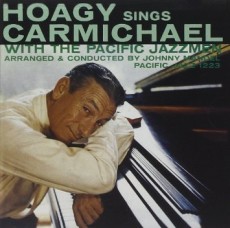
Daily Dose Of Jazz…
Hoagy Carmichael was born Howard Hoagland Carmichael on November 22, 1899 in Bloomington, Indiana. He was named Hoagland after a circus troupe “The Hoaglands” who stayed at the Carmichael house during his mother’s pregnancy. His mother was a versatile pianist who played accompaniment at silent movies and for parties and by age six, he started to sing and play the piano, easily absorbing his mother’s keyboard skills.
Never having formal piano lessons by high school, the piano was the focus of his after-school life, and for inspiration he would listen to ragtime pianists Hank Wells and Hube Hanna. By eighteen he was living in Indianapolis, working in manual jobs in construction, a bicycle chain factory, and a slaughterhouse to help out the family’s income. During this period he befriended the Black bandleader and jazz pianist Reg DuValle, the elder statesman of Indiana and Rhythm King, who taught his jazz improvisation.
Carmichael went on to attend Indiana University and Indiana University School of Law graduating with a bachelor degree and law degree, respectively. He played with Bix Beiderbecke who introduced him to future collaborator, Louis Armstrong.
He began to compose song like Washboard Blues, Boneyard Shuffle and Riverboat Shuffle. In 1927 Hoagy composed and recorded Stardust, one of his most famous songs. His first major song with his own lyrics was Rockin’ Chair recorded by Armstrong and Mildred Bailey. He recorded it himself in 1930 with Beiderbecke, Bubber Miley, Benny Goodman, Tommy Dorsey, Bud Freeman, Eddie Lang, Joe Venuti and Gene Krupa.
He would go on to team up with Johnny Mercer and Frank Loesser, composing Georgia On My Mind, Up A Lazy River, In The Still Of The Night, Skylark, I Get Along Without You Very Well, The Nearness Of You and Baltimore Oriole among some many other jazz standards.
With his financial and social condition improved dramatically he began hobnobbing with George Gershwin, Fred Astaire, Duke Ellington and other music giants in the New York scene. He appeared in fourteen films, always performing one of his songs, appeared in numerous television roles, hosted musical variety radio and television programs, received Academy Awards for Best Original Song, was awarded an honorary doctorate in music by Indiana University, inducted into the Gennett Records Walk of Fame, recorded with Annie Ross and Georgie Fame, and penned two autobiographies.
Composer, pianist, singer, songwriter and actor, Hoagy Carmichael, passed away of heart failure in Rancho Mirage, California on December 27, 1981.
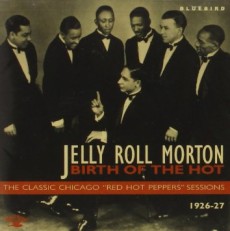
Daily Dose Of Jazz…
Jelly Roll Morton was born Ferdinand Joseph LaMothe on October 20, 1890 into a common-law creole of color family in the Faubourg Marigny neighborhood of downtown New Orleans, Louisiana. He started playing music as a child, showing early talent. After his parents separated, his mother married a man named Mouton and anglicizing it changed it to Morton.
At the age of fourteen, Morton began working as a piano player in a Storyville brothel, then known as a sporting house. In that atmosphere he often sang smutty lyrics and it was there he took the nickname “Jelly Roll”, which was African American slang for female genitalia. While working there, he was living with his religious, church-going great-grandmother; he had her convinced that he worked as a night watchman in a barrel factory. After Morton’s grandmother found out that he was playing jazz in a local brothel, she kicked him out of her house. However, Tony Jackson, also a pianist at brothels and an accomplished guitar player, was a major influence on his music.
Around 1904, Jelly Roll started touring in the American South, working with minstrel show, gambling and composing. He moved to Chicago in 1910 and New York City the following year where future stride greats James P. Johnson and Willie “The Lion” Smith caught his act, years before the blues were widely played in the North. His works Jelly Roll Blues, composed in 1915, has arguably become the first jazz song ever published. New Orleans Blues, Frog-I-More Rag, Animus Dance and King Porter Stomp followed as they were composed during this period. In 1917, he followed bandleader William Manuel Johnson Johnson’s sister Anita Gonzalez to California, where his tango The Crave, made a sensation in Hollywood. Returned to Chicago in 1923 to claim authorship of his recently published rag, “The Wolverines”, which had become a hit as “Wolverine Blues” in the Windy City. He released the first of his commercial recordings, first as piano rolls, then on record, both as a piano soloist and with various jazz bands.
In 1926, Morton succeeded in getting a contract to record for the largest and most prestigious company in the United States, Victor. This gave him a chance to bring a well-rehearsed band to play his arrangements. These recordings by Jelly Roll Morton & His Red Hot Peppers are regarded as classics of 1920s jazz. They featured Kid Ory, Omer Simeon, George Mitchell, Johnny St. Cyr, Barney Bigard, Johnny Dodds, Baby Dodds and Andrew Hilaire. And the group became one of the first acts to be booked on tour by MCA. Moving to New York City in 1928 he continued to compose and record for Victor with the aforementioned in addition to George Baquet, Albert Nicholas, Wilton Crawley, Russell Procope, Lorenzo Tio, Artie Shaw, Bubber Miley, Johnny Dunn, Henry “Red” Allen, Sidney Bechet,, Paul Barnes and Bud Freeman, Pops Foster, Paul Barbarin, Cozy Cole and Zutty Singleton.
During the Great Depression Morton lost his contract with Victor, struggled financially and took a job with a traveling burlesque show for steady income. In 1935, his 30-year-old composition King Porter Stomp arranged by Fletcher Henderson became Benny Goodman’s first hit and swing standard but Jelly Roll received no royalties from its recordings.
A move to Washington, DC saw him becoming the manager, piano player, master of ceremonies, bouncer and bartender of a bar located at 1211 U Street in the NW Black section of town called Shaw. Unable to make it a success due to the owner’s bad business decisions and being stabbed by a friend of the owner, Morton’s wife demanded they leave DC. Before his departure folklorist Alan Lomax invited him to record music and interviews at the Library of Congress, which ended after eight hours, though Lomax conducted longer interviews but only to notes without recording.
When Morton was stabbed and wounded, a nearby whites-only hospital refused to treat him, as the city had racially segregated facilities. Transported to a black hospital farther away it was several hours before being attended to and his recovery suffered, often he became short of breath. Worsening asthma sent him to a New York hospital for three months at one point and although he continued to suffer from respiratory problems when visiting Los Angeles, California with manuscripts of new tunes and arrangements, planning to form a new band and restart his career, pianist and composer Jelly Roll Morton passed away on July 10, 1941, after an eleven-day stay in Los Angeles County General Hospital. He was inducted into the Rock and Roll Hall of Fame, the Louisiana Hall of Fame and is a charter member of the Gennett Records Walk of Fame.
More Posts: piano
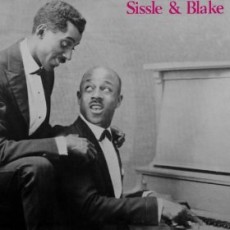
Daily Dose Of Jazz…
Noble Lee Sissle was born July 10, 1889 in Indianapolis, Indiana. His father was a pastor, his mother a schoolteacher and juvenile probation officer. As a youth he sang in church choirs and as a soloist with his high school’s glee club in Cleveland, Ohio. He went on to attend De Pauw University in Greencastle, Indiana on scholarship, later transferring to Butler University in Indianapolis before turning to music full-time.
In 1918 Sissle joined the New York 369th Infantry Regiment and helped to form the 360th Regiment Band. He played violin and also served as drum major for the 369th, and under James Europe’s leadership is now considered amongst the greatest jazz bands of all time. He sang several vocals on the last disc recorded by the band that was released in March 1919.
Leaving the army after the war he joined Europe’s civilian version of the band. Not long afterwards, a disgruntled band member murdered Europe thus leaving Noble to take temporary charge of the band with the help of his friend Eubie Blake. Years earlier the two had struck up a partnership after meeting in Baltimore, Maryland. They would go on to perform in vaudeville, collaborate on the songs I’m Just Wild About Harry and Love Will Find A Way, and then produce the musical Shuffle Along and The Chocolate Dandies. He is the only Black artist to appear in the Pathe film archives.
In 1923, Sissle made two films for Lee DeForest’s Phonofilm Sound-On-Film process titled Noble Sissle and Eubie Blake featuring their song Affectionate Dan, and Sissle and Blake Sing Snappy Songs featuring Sons of Old Black Joe and My Swanee Home. These films are preserved in the Maurice Zouary film collection at the Library of Congress.
He would also appear in other short films, performed with Walter Donaldson, Nina Mae McKinney, the Nicholas Brothers and Adelaide Hall. In 1954, New York radio station WMGM, owned by the Loew’s Theatre Organization, signed him as a disc jockey. His show featured the music of African-American recording artists. Jazz composer, lyricist, bandleader, singer and playwright Noble Sissle passed away on December 17, 1975 at the age of 86 in Tampa, Florida.
More Posts: vocal
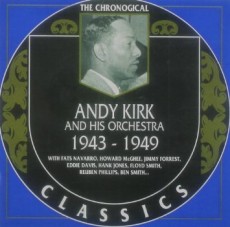
Daily Dose Of Jazz…
Andrew Dewey Kirk was born on May 28, 1898 in Newport, Kentucky but grew up in Denver, Colorado and was tutored by Paul Whiteman’s father, Wilberforce. He started his musical career playing with George Morrison’s band, but then went on to join Terence Holder’s Dark Clouds of Joy. In 1929 he was elected leader after Holder departed, renamed the band Clouds of Joy and also relocated the band from Dallas, Texas, to Kansas City, Kansas.
Also known as the Twelve Clouds of Joy for the number of musicians, they set up in the Pla-Mor Ballroom on the junction of 32nd and Main. They made their first recording for Brunswick Records that same year. Mary Lou Williams came in as a last moment pianist and so impressed the label’s Dave Kapp that she became a regular member and arranger of the band.
With the move they grew highly popular as they epitomized the Kansas City jazz sound and in mid-1936 Andy signed with Decca and made scores of popular records for the next decade. In 1938, he and band held the top spot of the Billboard chart for 12 weeks with “I Won’t Tell a Soul (I Love You)”, written by Hughie Charles and Ross Parker and featured Pha Terrell on vocals. In 1942 leading His Clouds of Joy, they recorded “Take It and Git”, which on October 24, 1942, became the first single to hit number one on the Harlem Hit Parade, the predecessor to the Billboard R&B chart. In 1943, with June Richmond on vocals, he had a number 4 hit with “Hey Lawdy Mama”.
Over time the band had Buddy Tate, Claude Williams, John Williams, bill coleman, Don Byas, Shorty Baker, Howard McGhee, Jimmy Forrest, Fats Navarro, Charlie Parker, Ben Thigpen,, Hank Jones, Joe Williams and Reuben Phillips among others.
In 1948, Kirk disbanded the Clouds of Joy and continued to work as a musician, but eventually switched to hotel management and real estate, but kept his hand in music serving as an official in the Musicians’ Union.[
Although the leader of the band, saxophonist and tubist Andy Kirk seldom was a soloist, utilizing the talent in his band for the spotlight. His genius lay in realizing how best to make use of his band members’ skills. On December 11, 1992 at the age of 94, he passed away in New York City.
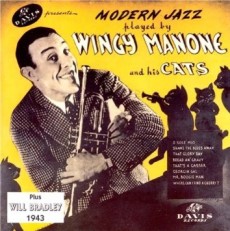
Daily Dose Of Jazz…
Wingy Manone was born Joseph Matthews Manone on February 13, 1900 in New Orleans, Louisiana. He lost an arm in a streetcar accident, which resulted in his nickname of “Wingy”. He used prosthesis so naturally and unnoticeably that his disability was not apparent to the public.
After playing trumpet and cornet professionally with various bands in his hometown, Manone began to travel across America in the 1920s, working in Chicago, New York City, Texas, Mobile, California, St. Louis and other locations; he continued to travel widely throughout the United States and Canada for decades.
Wingy’s was a frequently recruited musician for recording sessions. He played and recorded with Benny Goodman and recorded fronting various pickup groups under pseudonyms like “The Cellar Boys” and “Barbecue Joe and His Hot Dogs.” His hit records included “Tar Paper Stomp” was later used as the basis for Glenn Miller’s “In The Mood” and a hot 1934 version of a sweet ballad of the time “The Isle of Capri”.
In 1943 he recorded several tunes as “Wingy Manone and His Cats”, performed in Soundies movie musicals and his autobiography, Trumpet on the Wing, was published in 1948. From the 1950s he was based mostly in California and Las Vegas, although he also toured through North America and Europe appearing at jazz festivals. In 1957, he attempted to break into the teenage rock-and-roll market with his version of Party Doll but never rose higher than 56 on the Billboard pop charts.
He composed numerous songs and in 2008, “There’ll Come a Time (Wait and See)” was used in the soundtrack to the Academy Award-nominated movie The Curious Case of Benjamin Button. Trumpeter, vocalist, composer and bandleader Wingy Manone remained active until his passing on July 9, 1982 in Las Vegas at the age of 82.
More Posts: trumpet


